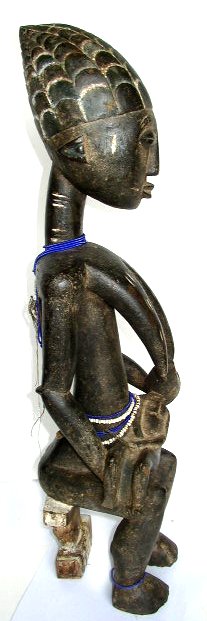
 Kulango (Koulango, Pakala), Côte d'Ivoire
Kulango (Koulango, Pakala), Côte d'Ivoire
Ancestress Figure. The 190,000 Kulango occupy a region in the Northwest Côte d'Ivoire that borders Burkina Faso (to the north) and Ghana
(to the east). The Kulango are matrilinear. The male head of each extended family
is responsible for offering sacrifices to the ancestral spirits. All disputes and
community affairs are handled by the village headmen and the religious chief. Throughout
the centuries, Dyula Muslim traders have come into the Kulango region with the intention
of converting the locals to Islam. However, the Kulango have resisted, and today, only
about 6% of them are Muslim. The majority (90%) continue to practice their traditional
ethnic religions. They believe in a supreme god who is not worshipped but is addressed in
association with "mother earth." The earth god, Tano, is a god of the
whole tribe. There is a shrine set up for Tano, and a yearly festival is held in his
honor. During disasters or hard times, the Kulango pray to the spirits of their ancestors
and make offerings of mashed yams. The Kulango celebrate many festivals, such as the
annual yam festival. This is a time when parents and children exchange gifts then eat a
meal of mashed yams and soup. There is also a festival for the dead, in which the gods and
ancestors are asked for guidance and prosperity. Dances and singing are part of both
festivals. The information pertaining to the
context of the use of ancestor figures is wanting.
Material:
wood
Size: 26½”x 6”x 6”

 Kulango (Koulango, Pakala), Côte d'Ivoire
Kulango (Koulango, Pakala), Côte d'Ivoire
 Kulango (Koulango, Pakala), Côte d'Ivoire
Kulango (Koulango, Pakala), Côte d'Ivoire